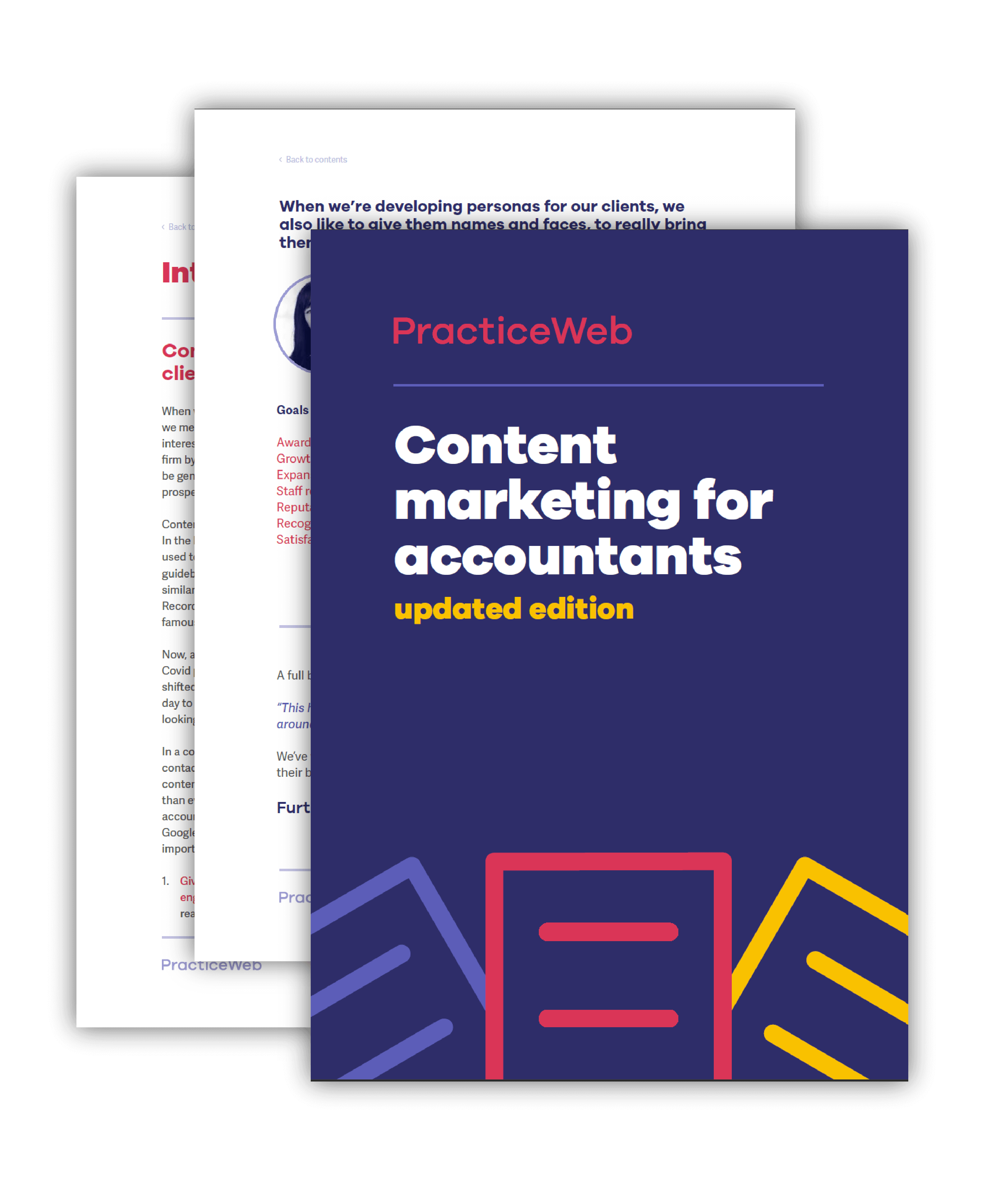Your accountancy firm has given content marketing a go – you’ve blogged, you’ve posted on social media – but the leads aren’t coming in. Here’s where you’re going wrong and what you need to do to fix it.
First, though, the obligatory answer to the question “What is content marketing?” I don’t want to give you a headache by going all meta, but this blog post is a good example of content marketing.
Put simply, it’s the process of promoting yourself or your business by generating informative, educational and/or entertaining material, rather than through advertising.
Generally, it means website content – blog posts (like this one) in particular. But the best content marketing comprises a mix of written material, graphics and video.
Posting on social media is also a form of content marketing, especially on LinkedIn where posts are often as long and in-depth as blog content.
Great content marketing makes you visible and sells your expertise. It generates traffic and valuable leads. It builds brands and cements professional reputations.
People are drawn to it because, compared to paid advertising, it’s good value – no photo shoots, film crews, special effects or voiceovers. It also feels gentler and more authentic, compared to the old hard-sell.
Unfortunately, for some people and businesses, it just doesn’t click.
That might be because someone has over-promised: tons of business with no effort and zero cost!
But it might just be that they’re going about it from slightly the wrong angle. Here are a few of the most common content marketing mistakes.
You don’t post enough
It’s obvious, really, but posting twice a year doesn’t count as content marketing.
When PracticeWeb clients ask me how often they ought to post, my answer is:
- once a day is ideal, but impractical for most
- weekly is great
- fortnightly is fine
- once a month is the bare minimum.
There are a few problems with infrequent blogging or social posting.
First, it suggests your heart isn’t in it and, in my opinion, readers and potential clients will pick that up.
Secondly, you won’t get better at it. There’s truth in the saying practice makes perfect – and the more you write, the less daunting the whole process becomes.
Finally, it means your content is less likely to be timely and relevant. Especially in 2022 – who cares what was happening two months ago? Things are changing each day.
And the single greatest benefit of frequent blogging? It will help you rank in search engine results.
There are millions of articles and lots of spurious stats on this but the important point is the more decent content you produce, the more there is for Google to get its teeth into – and the more opportunities you’ll have to build links between pages and posts.
Check out our updated 2022 edition of The complete guide to content for accountants for more on how this works and why it matters.
You post inconsistently
This is a subtly different problem to the one above – it’s about regularity of posting, not the volume of content.
As part of our content workshop process, we undertake analysis of our clients’ existing content and that of their competitors.
One thing I often notice is what I think of as the new year’s resolution pattern: a flurry of new blog posts in January through to March, slowly dwindling as the year goes on. Then, a year later, the cycle repeats.
I think two things are happening. First, accountancy firm marketing teams come back from the Christmas break, a new year ahead of them, and decide this is the year they’re really going to crack content marketing.
Secondly, in some cases, it’s that end-of-year reviews have taken place and someone has been told that keeping the practice blog up to date is a performance management objective.
In both cases, when things get busy, or enthusiasm dwindles, content quickly drops down the priority list.
This is where a content calendar comes in. Use that burst of energy at the start of the year for planning and getting colleagues on board. Draw up a detailed calendar with a realistic schedule of posts – why not aim for one a month to start with? – and then stick to it.
Download the updated eBook:Content marketing for accountants - 2022 edition.
Find out how content can help your firm engage with the clients it really wants by downloading our eBook.
Your content is boring
I’m sorry to be blunt but I see an awful lot of very dry content from accountancy firms.
It lacks punch, clarity and purpose.
There’s no name or face attached and no distinct tone of voice.
Often, it doesn’t even express an opinion or provide meaningful commentary – sure signs of authority and expertise.
And, worst of all, it can feel as if it’s been written for other accountants, not for clients or prospects who might struggle to understand industry jargon and usually want information in layman’s terms.
This is hard to fix because it’s about becoming a better writer, which is easier said than done. One way to snap yourself out of bad habits is to look at what your competitors are doing. If it’s bad, it might give you a glimpse into why your content isn’t connecting with people. And if it’s good, you can be inspired by it.
Here are some quick tips for making your writing more engaging:
- Start with a surprising item of information or a challenging statement.
- Imagine you’re writing for your favourite newspaper rather than an accountancy firm’s blog.
- Bring your experience, and that of your clients, into everything you write – make it feel real and human.
- Address your readers as if you are speaking to them directly – in the second person.
It’s about you, not the client
People don’t want to read content about how great you are – generally, there’s a problem they need help with or a question they want answering.
Defining buyer personas is a great way to put yourself in the shoes of your clients and start thinking about what they need rather than what you want to broadcast.
In coming up with personas, you’ll usually be asked to think about targeting client ‘pain points’ – they don’t have enough time to spend with their families, for example, or they’re worried about managing their tax return now they’ve inherited a flat. Your content should address those pain points.
Another shortcut here is to collect real questions from clients and use them as the basis for your content calendar.
Of course, you can promote your services but you have to earn it. For every 300 words of useful advice I reckon you can get away with about 20 words of outright self promotion. (But remember, every word is promoting your expertise and authority, just more subtly.)
You’re not sharing your content
If you’ve gone to the trouble of producing engaging, useful content, you should share it everywhere, from Facebook to LinkedIn, and probably multiple times, in multiple formats.
You should also be including relevant links in client newsletters and even in emails to specific clients, if it feels appropriate.
Unfortunately, this doesn’t always happen – and I really don’t know why.
Maybe people are a bit embarrassed to be seen to be shamelessly promoting themselves. Or perhaps they’re not confident in the quality of their content. I’ve heard at least one accountant say they don’t post on LinkedIn because they’re worried about being trolled.
The hard truth is, unless you’re a household name, or are consistently ranking highly in search engine results through SEO, your content won’t get seen unless you tell people about it.
Don’t be shy, don’t be modest – share the link and make sure the accompanying post gets across why people should be excited to read it.
For more advice on making content marketing work for your accountancy firm check out our updated 2022 edition of: Content marketing for accountants.
Take a look at our content marketing services that can help build traffic, increase engagement and drive more enquiries from your accounting firm’s website, emails and social media.





